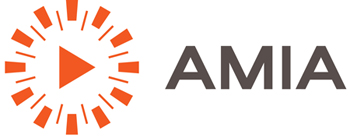Pre-Conference Workshops
![]()
8:30 AM – 5:30 PM | $100 Separate Registration Required
Small Gauge Projector Maintenance and Repair
Chair(s) and Speakers
- Taylor McBride, Smithsonian Institution
- Dino Everett, USC SCA Hugh M. Hefner Moving Image Archive
- Kristin Lipska, San Francisco Symphony
- Genevieve Havemeyer-King, Media Preservation Coordinator, New York Public Library
- Emily Mercer, Student Co-Chair, AMIA Projection and Technical Presentation Committee
The Small Gauge Amateur Film Committee and Presentation Committee host a full-day pre-conference workshop on small gauge projector maintenance and repair. The workshop will cover an array of 16mm, 8mm, and Super 8 projector models and their repair and maintenance protocol. Attendees will have the chance to work hands-on with the playback machinery and will leave with the knowledge of how to care for the projectors needed to view their archival film.
![]()
8:30 AM – 12:30 PM | $50 Separate Registration Required
Technology Selection and Implementation for Humans
Chair(s) and Speakers
- Kara Van Malssen, AVP
- Erwin Verbruggen, Netherlands Institute for Sound and Vision
Technologies such as DAM, MAM, CMS, or digital preservation systems have the potential to completely transform how our assets are managed, preserved, and made available. But choosing the right solution can be overwhelming, and even more daunting is planning for successful implementation. Where do we start? And how do we ensure that the project doesn’t fail (a whooping 25% of all technology projects do), or not fulfill the promise we envision (which another 25% likely will)? This workshop will walk participants through the process of technology selection and implementation, using a clear, step-by-step methodology, and leveraging a human-centered design approach. Participants will learn how to work with stakeholders to identify needs, goals, and requirements. They will also learn how to craft a comprehensive RFP/RFI, evaluate proposals, and plan for implementation and ongoing management. The workshop will be interactive, fast-paced, and fun!
9:00 AM – 5:30 PM | $125 Separate Registration Required
Describing Moving Images: Data Models, Standards, and Tools
Chair(s) and Speakers
- Randal Luckow, HBO
- Rebecca Fraimow, WGBH
- Andrea Leigh, Library of Congress
- Murray Browne, Turner Broadcasting
- Meghan Fitzgerald, NASA
- Rebecca Fraimow, WGBH Boston
This highly-interactive workshop will provide participants with real-world strategies to evaluate and implement data models, descriptive standards, controlled vocabularies, and shared data authorities, through practical hands-on exercises. Dynamic presentations will illustrate the role and purpose of putting in place a strong data model for bibliographic description, using BIBFRAME and FRBR examples, and the value of implementing standards such as LCSH, LCGFT, and AAT as data authorities. Participants will put these cataloging and metadata concepts directly into practice utilizing tools emerging from the NEH-funded PBCore Development and Training Project. A special hands-on session will apply genre/form headings to moving images, and show how they are used symbiotically with Library of Congress Subject Headings to describe both what a work is and what it is about. This workshop is intended for those with a moderate level of understanding of metadata standards and implementation strategies.
12:30 PM – 5:30 PM | $50 Separate Registration Required
The Reel Thing
Chair(s) and Speakers
- Grover Crisp, Sony Pictures
- Michael Friend, Sony Pictures
Curated by Grover Crisp and Michael Friend, The Reel Thing addresses current thinking and most advanced practical examples of progress in the field of preservation, restoration and media conservation.
1:30 PM – 5:30 PM | $50 Separate Registration Required
Archivist’s Guide to QuickTime
Chair(s) and Speakers
- Dave Rice, CUNY
- Annie Schweikert, NYU MIAP
QuickTime can refer to a video encoding, a proprietary Apple file format, a profile of an ISO file format, or a video player. You can actually use QuickTime to put QuickTime into your QuickTime. This workshop provides a technical tour of all things QuickTime with an emphasis on QuickTime, the audiovisual container. This workshop will review the architecture of QuickTime and demonstrate many features relevant to archival work, such as how significant characteristics such as interlacement, edit lists, color data, user metadata, timecode, and aspect ratio are stored (or not) within the format. We’ll cover QuickTime policies such as TN2162 that add additional requirements for the usage of uncompressed video with QuickTime. Join us to review how to inspect, validate, respond to, and manipulation QuickTime files.
